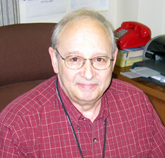 |  |
Wayne Fisher, Ph.D. | Cathleen Piazza, Ph.D. |
Wayne Fisher, Ph.D., has been appointed director of the MMI Center for Autism Spectrum Disorders and Hattie B. Munroe Professor of Behavioral Research. His wife, Cathleen Piazza, Ph.D., has been appointed professor in the department of pediatrics. Together, they will transform the former Brace Place space into a new Center for Autism Spectrum Disorders and Pediatric Feeding Disorders Program.
 |
Bruce Buehler, M.D. |
“Remodeling the building is a direct response to the needs of these new researchers and will allow them to continue their success here at UNMC.”
The recruitment of Drs. Fisher and Piazza, by any standard, is a coup for UNMC, Dr. Buehler said. Each has received national and international accolades for their work, but they are particularly key to MMI, he said, because they have extensive experience in developing national centers of expertise from the ground up.
“The Munroe-Meyer Institute can join the top tier of centers in the country in the treatment and research of autism,” Dr. Fisher said. “That’s why I came. MMI is clearly ready to put it all together and step up to that level.”
Dr. Piazza also envisions a high-caliber program. “I believe the Munroe-Meyer Institute can establish the foremost pediatric feeding disorders program in the United States,” she said. “I am excited by what I see in the tremendous collaborative environment here and the plans to create the kind of clinical and research facilities that will enable this degree of success.”
In 1999, Dr. Fisher formed the Marcus Behavior Center at the Marcus Institute in Atlanta, where he served as executive director until joining UNMC. He also has served as executive director of the Neurobehavioral Programs at the Kennedy Krieger Institute and professor of psychiatry at Johns Hopkins University School of Medicine (JHUSM) in Baltimore.
In 1999, Dr. Piazza was recruited to develop a pediatric feeding disorders program and a psychology-training program at the Marcus Behavior Center, while continuing to serve as an associate professor in psychiatry and behavioral sciences at JHUSM. Prior to that, she served as director of the Kennedy Krieger Institute’s Pediatric Feeding Disorders Program and director of training for the psychology department.
 |
Mike Leibowitz, Ph.D. |
Dr. Fisher was recruited to UNMC to direct the Center for Autism Spectrum Disorders and to develop and expand research at MMI in the areas of autism and behavioral genetics. In the space MMI is renovating for his clinical laboratory, Dr. Fisher’s goals are to train and supervise clinical researchers and therapists to better delineate behavioral phenotypes and develop more refined and specific behavioral interventions for a variety of disorders, including autism, self-injurious behavior and Attention Deficit Hyperactivity Disorder (ADHD).
Dr. Fisher has co-authored more than 100 research articles on severe behavior disorders among children with developmental disabilities. Most notably:
- His research team conducted the first population-based epidemiological investigations in the United States on autism, childhood onset, pervasive developmental disorders and hyperlexia.
- In 1992, his team (including Dr. Piazza) published the first study showing that presenting stimuli in a choice arrangement led to more accurate identification of effective reinforcers for individuals with autism and mental retardation.
In addition to his currently funded R01 grant, Dr. Fisher recently submitted a large multi-center R01 to compare indirect, direct and controlled functional analysis methods. He hopes to work collaboratively with other MMI researchers to develop a program project grant (P01) focused on the bio-behavioral assessment and treatment of autism stratified by genotype.
Dr. Piazza was recruited to build a premier pediatric feeding disorder program at MMI. “There are no other programs that offer intensive, interdisciplinary treatment,” Dr. Piazzo said. “In fact, there are very few such programs in the entire country.”
A feeding disorder is identified when a child is unable or refuses to eat or drink a sufficient quantity or variety of food to maintain proper nutrition. Mealtime difficulties have been estimated to occur in approximately 25 percent to 35 percent of normally developing children and approximately 33 percent to 80 percent of individuals with developmental disabilities.
The remodeling of the former Brace Place area will provide Drs. Fisher and Piazza room to pursue their special methods of research and clinical treatment, Dr. Leibowitz said.
Dr. Fisher’s area will include seven treatment rooms; three observation rooms with one-way mirrors; soundproofing; padded walls, floors and ceiling; a large playroom; and a reception area and office space. With his major NIH grant, Dr. Fisher may have as many as 17 staff members once he is fully operational.
Dr. Piazza’s area includes six treatment rooms, three observation rooms, four nap rooms, a pediatric feeding room and large professional pantry, as well as a parent’s lounge, children’s play room for siblings and office space.
“The Brace Place program has been successfully transitioned to community providers,” Dr. Leibowitz said. “All of the full-time staff was picked up by local providers so all the previous services will be available to the Nebraska community.”
Dr. Fisher received a bachelor’s of science degree from Michigan State University, and his Ph.D. from the University of Texas at Austin. He completed a predoctoral fellowship at the Crookston Regional Interdistrict Council in Crookston, Minn., in 1981. He also completed a postdoctoral fellowship in departments of psychology at the Kennedy Krieger Institute and pediatrics at JHUSM in 1986-87.
Following the postdoctoral fellowship, Dr. Fisher was appointed an assistant professor in the department of psychiatry at JHUSM and staff psychologist at the Kennedy Krieger Institute. He rose to executive director of the Neurobehavioral Programs at the Kennedy Krieger Institute and professor of psychiatry at JHUSM.
Dr. Piazza received her bachelor’s of science degree, master’s of science degree and Ph.D. from Tulane University in New Orleans. She completed a pre-doctoral internship in the department of pediatrics at JHUSM and the department of psychology at the Kennedy Krieger Institute, followed by a post-doctoral fellowship in 1988 at the same two institutions. She and Dr. Fisher met during their training at JHUSM.
Following her postdoctoral fellowship, Dr. Piazza was appointed an instructor in the department of psychiatry and behavioral science at JHUSM and director of behavioral programs for the severe behavior unit at the Kennedy Krieger Institute in 1988.
A great deal of support went into recruiting the researchers, Dr. Leibowitz said, citing Vice Chancellor for Research Thomas Rosenquist, Ph.D., who found short-term funding to develop the recruitment initiative; Programs of Excellence funding; the Hattie B. Munroe Foundation’s support for Dr. Fisher’s professorship, and Gail Werner-Robertson’s efforts to fund complementary activities for children with autism.